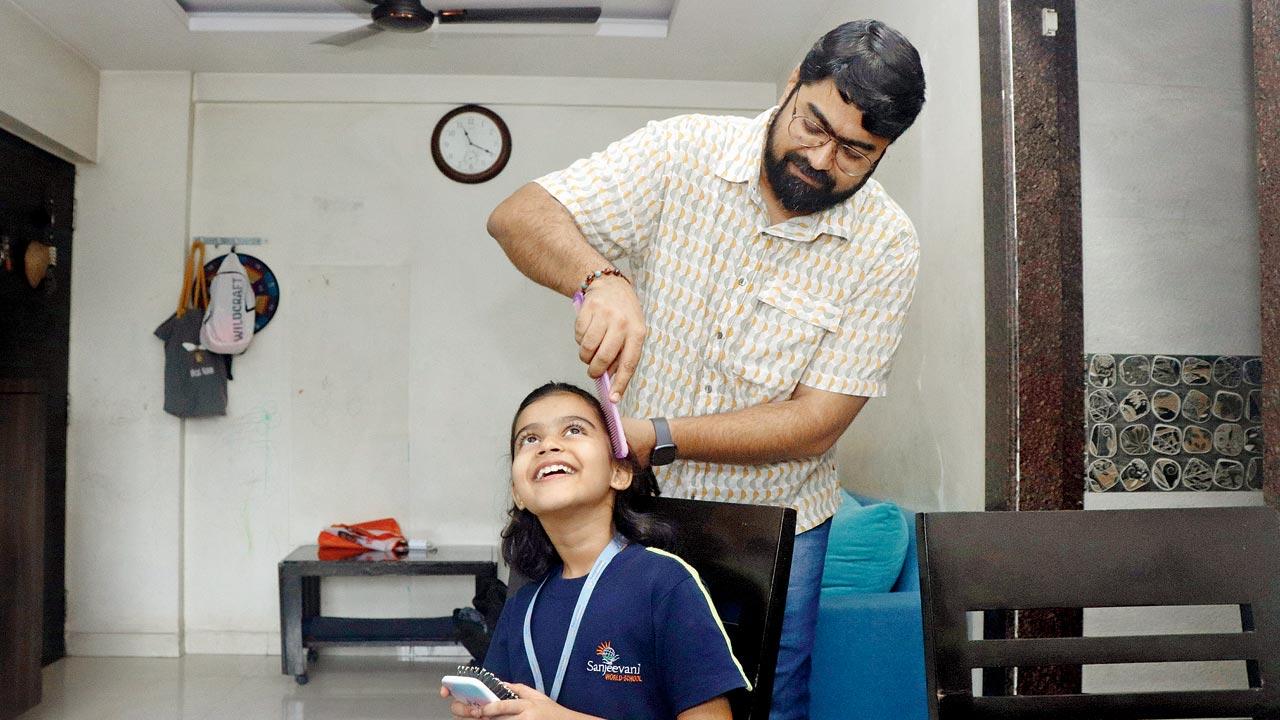Cricketer Jasprit Bumrah was boo-ed for racing back from the Asian Cup for his child’s birth, as if parenting isn’t for papa

In a former job, Aamod Potdar passed on the company’s reluctance to grant leaves to those reporting to him. Now, he works with an IT firm that understands when he needs time off to attend PTA meetings at his two-year-old’s playschool. Pic/Ashish Raje
I always wanted a daughter,” says Virat Singh with an excitement palpable even via text message. “I wanted to tie her choti before she goes to school, drop her to the bus, pick her up from school, listen to all her bak-bak and stories patiently… Will any organisation ever respect and understand my feelings of getting to do these tasks which will make me happy while I am working remotely?”
ADVERTISEMENT
Singh heads Communications with Asar, a development startup working on air pollution, climate change and other environment issues. Singh gets to work from home, though he travels a fair bit, which gives him and his spouse Dipti the flexibility of tag-teaming for parenting responsibilities.
And yet, when cricketer Jasprit Bumrah left the Asia Cup midway for the birth of his child, it was deemed unprofessional… even unpatriotic. But then, just look at the precedent: Just ahead of the ODI World Cup in February 2015, former skipper MS Dhoni said he would not go home from Australia to see his newborn, as he was “on national duties”. Of course, cricket is not just a game, and this was the World Cup… but it wasn’t the trenches. And much of the grandiosity attached to it comes from the revenue the matches generate through sponsorship, TRPs, advertising and tourism. National identity looks best when worn over an excessively commercial endeavour.
 Virat Singh switched professions in favour of a four-day work week with an organisation that puts family first so that he could enjoy watching seven-year-old Aarya grow—Zoom call interruptions, tantrums, bak-bak and all. Pic/Anurag Ahire
Virat Singh switched professions in favour of a four-day work week with an organisation that puts family first so that he could enjoy watching seven-year-old Aarya grow—Zoom call interruptions, tantrums, bak-bak and all. Pic/Anurag Ahire
Few, however, are talking about the underlying truth: that men are still excused from personal, domestic labour—such as caregiving for ill, dependant or senior family members. Any job they do outside the home is still seen as a contribution towards a greater good; of the country, the economy, or at least the multinational company’s bottom line.
A pre-pandemic Time Use Survey (TUS) measured the participation of men and women in paid and unpaid activities within 24 hours. The TUS is a Government of India initiative introduced in 2019, which conducts surveys on socio-economic issues. This survey included time spent in unpaid caregiving activities and unpaid domestic service producing activities of the household members. The National Statistical Office, which conducts the TUS, observed 1,38,799 households (82,897 rural; 55,902 urban) during January-December 2019 and, among other things, found that 81.2 per cent of women engage in unpaid domestic work in their own household, as opposed to 26.1 per cent of the men. Within this, 14 per cent men took on caregiving responsibilities of family members such as children, spouses, parents or in-laws, in contrast to 27.6 per cent women. A slightly higher percentage of rural men were found to participate in housework and caregiving.
In urban areas, much of it has to do with the old-world order, where even corporates assumed that caregiving responsibilities lay solely with women: It would be much more acceptable for a woman to arrive at work late, citing having to take an in-law to the doctor’s, than for a single father, even an oncology surgeon, to take a half day for his daughter’s PTA.
 At the start of his career, Chris D’Souza requests to leave in the middle of the work day to handle domestic violence at home were met with apathy
At the start of his career, Chris D’Souza requests to leave in the middle of the work day to handle domestic violence at home were met with apathy
“I worked with a reputable hospital,” says a senior oncologist from Pune, a single father to a now adult daughter, “and no matter how much they boasted about building a family-first, supportive environment, the undertones while giving me leeway when she was ill or needed me was ‘can’t someone else, perhaps the nanny, take care of it?’”.
Paternity leave is often little more than a feeble dad joke: One former media person got four days off after the birth of his son, which was reluctantly extended by two more days when his wife had to stay longer in the hospital due to labour complications.
“It begins even before you ask for leave,” he says, “There is an atmosphere of fear and suspicion, making you feel you don’t deserve days off unless there is a calamity such as the death of an immediate relative. It would make me anxious to ask for a day off to take my mother to the doctor, and it would build up until I got a response from the department head approving it… which would usually be a passive aggressive reminder of how much leave I had already taken.”
Chris D’Souza faced worse insensitivity when he lived in Kandivli and worked as IT support staff for an IT company in Mumbai from 2013-2016. “It was the early years of my career,” says the engineer who is now in his early 30s and works remotely from Dehradun, “and I didn’t have that much clout to demand leave. My father was verbally and physically abusive to my mother, and I would get messages from my neighbours in the middle of the work day. If I requested to leave, my manager would say, ‘What will you do? Just call the cops and they will take care of it…’ not realising that I would need to take care of my mother.” To complicate matters, his department did not have a fixed day off.
When Aamod Potdar worked with an IT firm in Pune in 2015-16, his company’s denial to recognise a man’s necessity to participate in familial duties trickled down in his attitude towards team members requesting him for days off. “I would have the same mindset; it became part of company culture.” He remembers a time he needed to take some days off to travel to Mumbai after an uncle passed away. “After just one day away,” says the Charni Road resident and father to two-year-old Aadvika, “I got a call asking when I would be back. In the end, I got only three days off.”
Potdar now works for a multinational firm that produces software for Indian pharma companies and easily gets a week of bereavement leave “without being guilt-tripped or being asked who the dead relative is [to judge necessity]”. His wife is a professor and he can even easily request half-a-day off to attend a PTA meeting at his two-year-old daughter’s playschool.
Fortunately, increasingly more employers, especially start-ups, are taking cue from American companies and focusing on facilitating life-work balance and prioritising mental health for men. A sales professional we spoke to took up a job in Kolkata in 2017, in the early years of his career, to be closer to his parents, who lived five hours away in Jharkhand. “I thought I would go home for the weekend,” he says, “But I was even denied leave for my brother’s engagement ceremony, saying that was an important month for us, target-wise. My manager said since I would take leave for his wedding anyway, why go for the engagement... When I went regardless, every small mistake I made in the next few months was pinned to my absence that month—even though I was among the top 10 sales performers that month.”
Now, he works for a startup from the hills in northeast India, easily having procured permission to work remotely for four to six months citing family emergency. “I was living in Mumbai and my mental health wasn’t too good,” he says. “Plus, the rents in Mumbai were too high. I told my bosses I needed some time off, and they only asked how much, without questioning which family member was ill. They took the effort to work out how I could perform my duties remotely. When a company takes a stand for you like this, you give your best. My productivity has increased.”
Similarly, Singh says he gives Asar his “700 per cent” because they understand how important parenting his seven-year-old is for him. “When I first wrote an email requesting leave, three or four months after I joined the firm in 2019, I was highly apologetic. I was invited to a prestigious conference in England and really wanted to attend,” says the Dahisar resident, “Within three minutes, the CEO— Vinuta Gopal—responded saying this was a great opportunity that I certainly should not miss. I re-read the e-mail a few times to check mere aankhon ka dokha toh nahin hai. Then, I trepidatiously wrote back saying since I had family there, I would like to take my family too and extend the visit to include a vacation. He replied that I certainly must.”
Singh now leaves a meeting mid-way at 12.30 to drop his daughter to the school bus. He can take a day off citing innocuous reasons such as, ‘My daughter is cranky and needs me’ or ‘We’re in Lonavla and Aarya is having such a good time, she wants to stay another day’. His gamble to move out of his older profession into something that respects his choice to watch her grow has paid off. “Asar gives me that. I travel a lot but when I am at home, I can compensate and watch her grow. She interrupts so many online meetings and no one cringes. In fact, everyone says hi to her or asks to see the art she has created…”
Why, after all, should moms have all the fun?
 Subscribe today by clicking the link and stay updated with the latest news!" Click here!
Subscribe today by clicking the link and stay updated with the latest news!" Click here!







